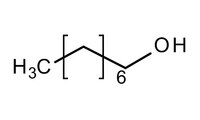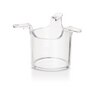820931 Sigma-Aldrich1-Octanol
1-Octanol for synthesis. CAS 111-87-5, chemical formula CH₃(CH₂)₇OH.
More>> 1-Octanol for synthesis. CAS 111-87-5, chemical formula CH₃(CH₂)₇OH. Less<<Synonyms: n-Octyl alcohol
Recommended Products
Overview
| Replacement Information |
|---|
Key Spec Table
| CAS # | EC Number | Hill Formula | Chemical Formula | Molar Mass |
|---|---|---|---|---|
| 111-87-5 | 203-917-6 | C₈H₁₈O | CH₃(CH₂)₇OH | 130.23 g/mol |
Products
| Catalogue Number | Packaging | Qty/Pack | |
|---|---|---|---|
| 8.20931.0100 | Plastic bottle | 100 ml | |
| 8.20931.1000 | Plastic bottle | 1 l | |
| 8.20931.2500 | Plastic bottle | 2.5 l |
| Description | |
|---|---|
| Catalogue Number | 820931 |
| Synonyms | n-Octyl alcohol |
| Description | 1-Octanol |
| References |
|---|
| Product Information | |
|---|---|
| CAS number | 111-87-5 |
| EC number | 203-917-6 |
| Hill Formula | C₈H₁₈O |
| Chemical formula | CH₃(CH₂)₇OH |
| Molar Mass | 130.23 g/mol |
| HS Code | 2905 16 85 |
| Structure formula Image | |
| Quality Level | MQ200 |
| Applications | |
|---|---|
| Application | 1-Octanol for synthesis. CAS 111-87-5, chemical formula CH₃(CH₂)₇OH. |
| Biological Information |
|---|
| Dimensions |
|---|
| Materials Information |
|---|
| Toxicological Information | |
|---|---|
| LD 50 oral | LD50 Rat > 5000 mg/kg |
| LD 50 dermal | LD50 Rabbit > 2000 mg/kg |
| Safety Information | |
|---|---|
| Categories of danger | irritant |
| Product Usage Statements |
|---|
| Storage and Shipping Information | |
|---|---|
| Storage | Store below +30°C. |
| Packaging Information |
|---|
| Transport Information | |
|---|---|
| Declaration (railroad and road) ADR, RID | Kein Gefahrgut |
| Declaration (transport by air) IATA-DGR | No Dangerous Good |
| Declaration (transport by sea) IMDG-Code | No Dangerous Good |
| Supplemental Information |
|---|
| Specifications | |
|---|---|
| Assay (GC, area%) | ≥ 99.0 % (a/a) |
| Density (d 20 °C/ 4 °C) | 0.824 - 0.826 |
| Identity (IR) | passes test |
| Global Trade Item Number | |
|---|---|
| Catalogue Number | GTIN |
| 8.20931.0100 | 04022536469775 |
| 8.20931.1000 | 04022536469782 |
| 8.20931.2500 | 04022536469799 |
Documentation
1-Octanol SDS
| Title |
|---|
1-Octanol Certificates of Analysis
| Product Number | Packaging | Specification | Lot Number |
|---|---|---|---|
| 8.20931.0100 | Plastic bottle | PDF Specification Document | |
| 8.20931.1000 | Plastic bottle | PDF Specification Document | |
| 8.20931.2500 | Plastic bottle | PDF Specification Document |













